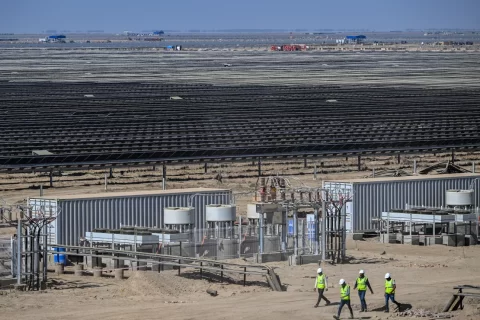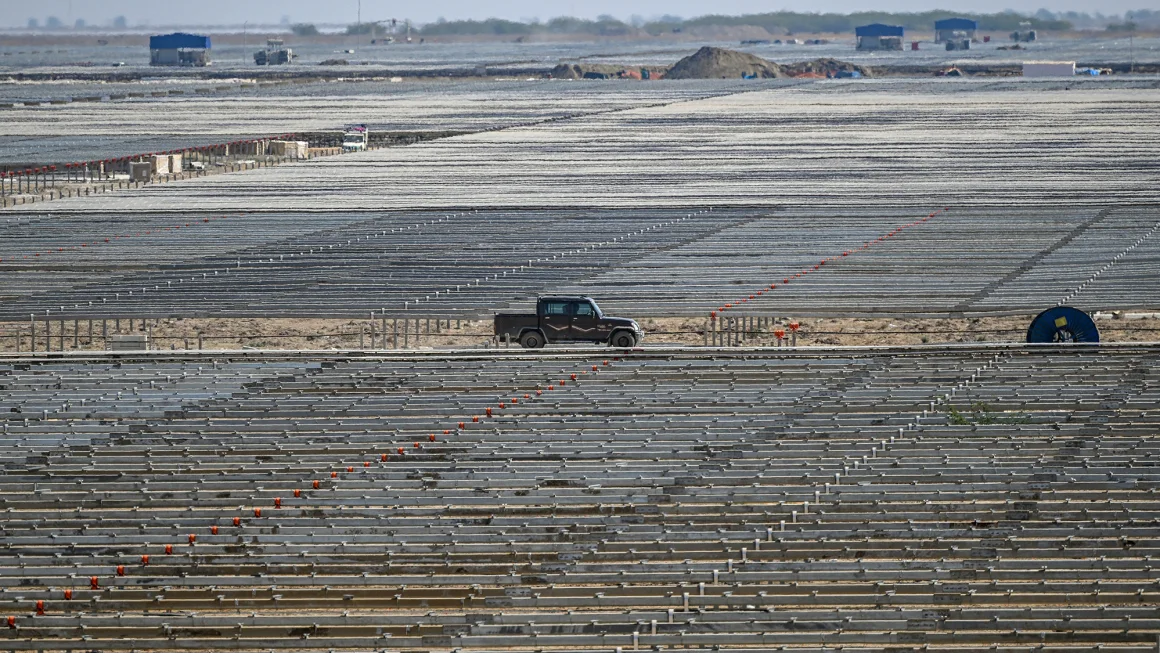Indian billionaire who made fortune from coal is building world’s biggest clean energy plant visible from space.
Adan plans to transform 200 square miles of empty and barren salt deserts in Gujarat, India into a massive energy park utilizing solar and wind power plants, he told CNN Business
Sagar Adani, CEO of Adani Green Energy Limited (AGEL) is building the world’s biggest clean energy plant, which is about five times the size of Paris and capable of generating enough electricity to power Switzerland, CNN reported. This plant is located in the western Indian state of Gujarat.
The park once completed in about five years should generate enough clean electricity to power 16 million Indian homes.
Situated about 12 miles from one of the world’s most dangerous borders separating India and Pakistan, the Khavda Renewable Energy Park will cover more than 200 square miles and be the world’s largest power plant regardless of the energy source, AGEL said.
“A region so large, a region that is so unencumbered, there’s no wildlife, there’s no vegetation, there’s no habitation. There is no better alternative use of that land,” said Adani.
Adani is the executive director of Adani Green Energy Limited (AGEL). Adan also the nephew of Gautam Adani, Asia’s second richest man, whose fortune of $100 billion comes from the Adani Group, India’s biggest coal importer and a leading miner of the dirty fuel. Founded in 1988, the conglomerate has businesses in fields ranging from ports and thermal power plants to media and cements. Its clean energy unit AGEL is building the Khavda Renewable Energy Park, the world’s biggest clean energy plant.
The success of the Khavda Renewable Energy Park is very critical to India’s efforts to reduce reliance fossil fuel and will help hit its climate goals while meeting the burgeoning energy needs of the world’s most populous nation and fastest-growing major economy. Currently, coal still accounts for 70% of the electricity India generates.
Read also: Construction of world’s largest renewable energy park begins, India

How much will the world’s biggest clean energy plant cost to build?
The construction of Khavda Renewable Energy Park, touted as the world’s biggest clean energy plant in Gujarat, India, carries a hefty price tag of $20 billion, CNN reported.
AGEL plans to invest $100 billion into energy transition over the next decade, with 70% of the investments ear-marked for clean energy.
Adani Group’s clean energy venture comes at a time when India has set itself some very ambitious climate goals. Prime Minister Narendra Modi has promised that renewable sources such as solar and wind power will meet 50 percent of India’s energy requirements by the end of this decade.
Read also: New milestone achieved for Subansiri Lower Hydroelectric Project in India
India is the world’s third-largest energy consuming country, although its energy use and emissions per person are much less than half the world average, the data from the Paris-based International Energy Agency (IEA) shows.
But that could change rapidly, thanks to rising incomes, the energy demand has doubled since 2000, with 80% of it still being met by coal, oil and solid biomass. Over the next 30 years, the rapidly-expanding economy will see the largest energy demand growth of any country in the world, the IEA said.
For India to meet its growing needs, relying on fossil fuels could lead to disastrous consequences for addressing the climate crisis.
The electricity demand in India is expected to skyrocket in the coming years because of factors ranging from improved living standards to climate change. There has been deadly heatwaves across India, and as a result, air conditioner ownership is set to see a sharp spike in the coming years.
By 2050, the total electricity demand from residential air conditioners in India is set to exceed the total energy consumption in the whole of Africa today, the IEA said.
Read also: World’s largest renewable energy park project achieves significant milestone
